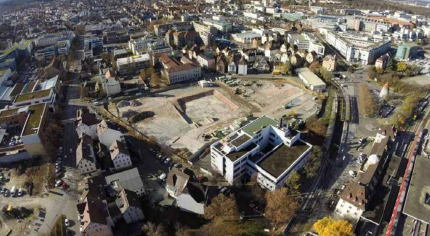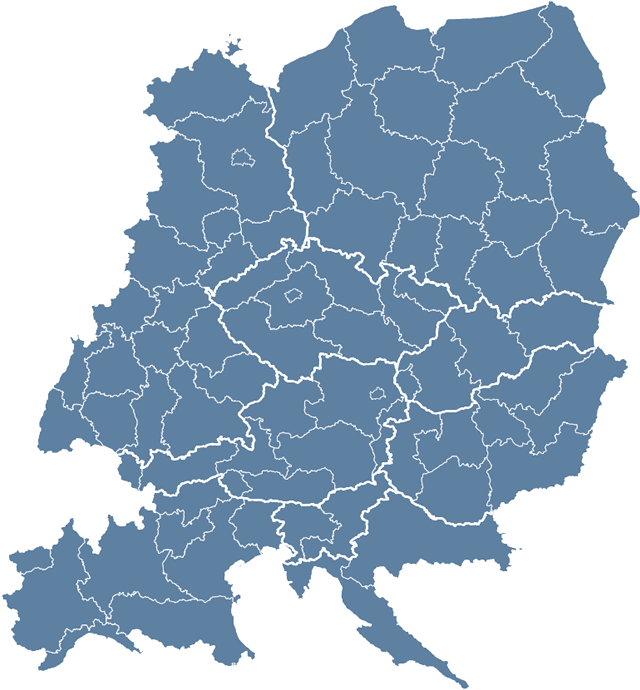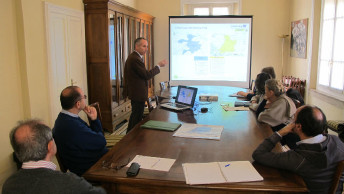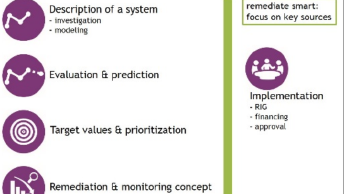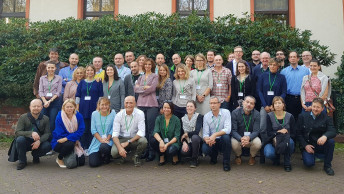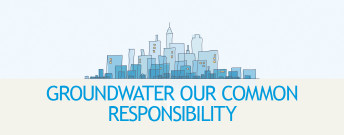AMIIGA
AMIIGA (INTEGRATED APPROACH TO MANAGEMENT OF GROUNDWATER QUALITY IN FUNCTIONAL URBAN AREAS) is a project with 6 countries, 12 project partners, 8 regions, 7 pilot actions, 2.9 million euro project budget and 2.4 million euro ERDF. AMIIGA built on and capitalized the results of previous projects especially MAGIC and FOKS.
Many countries in Central Europe are dealing with the impacts of environmental damages that occurred since the late 19th century and in the 20th century as a result of improper handling of hazardous substances, especially in industrial production. With the development of urban areas in the second half of the 20th century, many industrial sites became part of residential areas. Although industrial enterprises have gradually ceased their activities and production or have been disposed of outside residential areas, in many cases the pollution of the rock environment and groundwater has remained unresolved. As a result, polluted sites are part of the cities in Central Europe.
Groundwater contamination is a problem that goes beyond sites and any administrative boundaries. Contamination sources located in “city core” affect the groundwater quality of “hinterlands” downstream and vice versa. It requires effective intervention at the medium (FUA) scale, neglected in the existing legislation.
AMIIGA focused on integrated assessment, remediation and management strategies, as well as on the development of tools for characterization/prioritization of groundwater contamination sources.
Each pilot FUA of AMIIGA represents a serious problem for local or regional authorities. They differ in the type of pollution, hydrogeological conditions and threats from pollution (e.g. risk of damage to drinking water sources, degradation of mineral springs, threat to the health of the population etc.).
12 project partners have prepared sets of pilot activities for 7 pilot FUAs and developed a management strategy and a long-term management plan to address pollution on specific FUAs. In all pilot actions, the new technical tools developed in the AMIIGA project were used, which enabled these innovative resources to be successfully verified in practice.
AMIIGA NUMBERS
Partners
Countries
Pilot Actions
Associated Partners
Outputs
Guidelines for Innovative tools
AMIIGA Guidelines is a practical document that summarize the innovative tools developed by the project. It will help the decision makers and practitioners in selecting and using the most appropriate tools for groundwater management. The Decision Tree and the SWOT analysis will support the users to assess the available information, determine the extent of groundwater contamination, clarify the origin of contamination, plan and select measures and remediation actions.
It is available in: English, Italian, German, Polish, Slovenian, Czech, Croatian.
TRAINING
AMIIGA implemented 8 transnational trainings for improving technical skills and cooperative development of innovative tools. The trainings were very useful to help the partners to implement the groundwater tools, to compare different case studies and experiences and to combine different approaches and methodologies. The attached factsheets present the details of the trainings, the lessons learned and information on the transferability in Central Europe.
Read more: Milan 2016 |
Liberec 2017 | Ljubljana 2017 |
Milan 2018 | Milan 2017 |
Liberec 2018 | Parma 2018 |
Ljubljana 2018
TRAININGS
Seminars were held in each participating region of AMIIGA to engage and train on the preparation and application of groundwater management plans. The participants were decision makers of FUAs and practitioners in charge environmental quality. Here attached you find recommendations, lessons learned, added value of transnational cooperation and details of the seminars.
Read more: Stuttgart 2017 |
Milan 2017 | Ljubljana 2018 | Jaworzno 2019 | Ljubljana Sep 2018 | Parma 2017 | Zadar 2017 |
Milan 2019
Pilot ACTIONS
- Jaworzno Bioreactive wall
- Ljubljana Remediation concept drinking water
- Milan Hot spot & multiple point diffuse contamination
- Milan Wells for diffuse and site-specific contamination
- Novy Bydzov In-situ biologically enhanced remediation
- Novy Bydzov Treatment & restoring of natural conditions
- Parma Monitoring wells
- Parma Natural attenuation
- Stuttgart Installation of integral monitoring wells
- Stuttgart Integral monitoring
- Zadar Analytical inspection potential
Pilot Actions
Pilot Action 1
Bokanjac FUA, Croatia: Solutions for the inverse problem using the FOKS tools in Karst
Pilot action on the integral investigation of groundwater pollution sources, endangering with nitrates and pesticides the Zadar water supply system.
Application of integral groundwater investigation have suggested measures to assure the quality of drinking water.
Read more
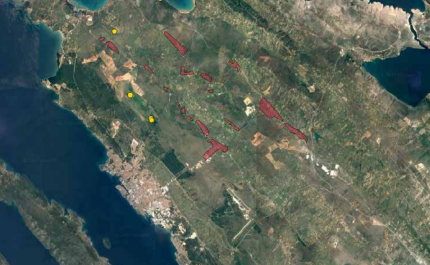
Pilot Action 2
Ljubljana, Slovenia: Remediation concept from drinking water perspective for diverse pollutants in typical Slovenian FUA
Pilot action on comprehensive foundation to implement remedial measures for typical urban core and hinterland sources of contaminations (landfill-industrial-sewage-agriculture) in aquifer supplying drinking water, based on the risk assessment approach from drinking water supply and Water Safety Planning perspective. Read more
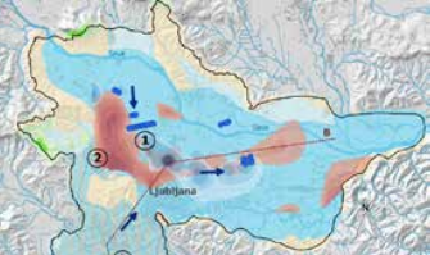
Pilot Action 3
Milan, Italy: Distinction between site-specific and diffused contamination in Milan FUA
AMIIGA enabled the implementation of tools to distinguish point sources of pollution from diffuse contamination, the development of a set of measures and the Management plan, to monitor and manage pollution and prevent further groundwater contamination.
Read more
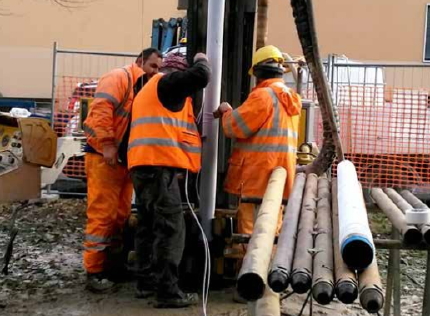
Pilot Action 4
Parma, Italy: Assessment of natural attenuation potential as a remediation option in Parma FUA
It evaluated the natural attenuation processes and its applicability at the FUA scale as an option for remediation of groundwater polluted by chlorinated hydrocarbons. Periodical monitoring campaigns were implemented in existing and new monitoring wells for the analyses of specific compounds, and the application of innovative tools.
Read more
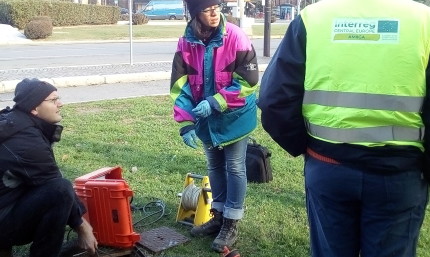
Pilot Action 5
Novy Bydzov, Czech Republic: In-situ biologically enhanced remediation
The innovative remedial technology Biological Enhanced Reductive Dehalogenation was applied for decreasing the contents of chlorinated hydrocarbons. The pilot demonstrated the exemplary case study of processing the biologically enhanced remediation of groundwater polluted with chlorinated hydrocarbons.
Read more
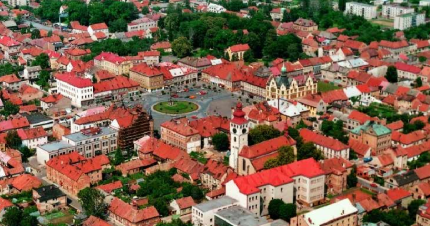
Pilot Action 6
Jaworzno, Poland: Passive groundwater treatment by bioreactive wall in FUA
The novel technology of passive bio-reactive barrier (combining physical, chemical and biological in situ treatment of contaminated groundwater using different reactive materials) was applied to decrease the contents of HCH in the area of groundwater contamination with pesticides downstream the Chemical Plant Organika-Azot S.A.
Read more
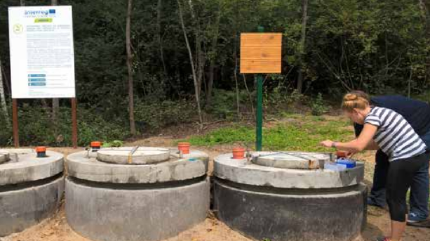
Pilot Action 7
Stuttgart, Germany: Integral monitoring of remedial measures efficiency in Stuttgart FUA
AMIIGA enabled the City of Stuttgart to address the issue of the existing mixed CHC-plumes in public areas and their potential threat to deep aquifers, that discharge 19 mineral springs used for medical and spa purposes.
Read more
